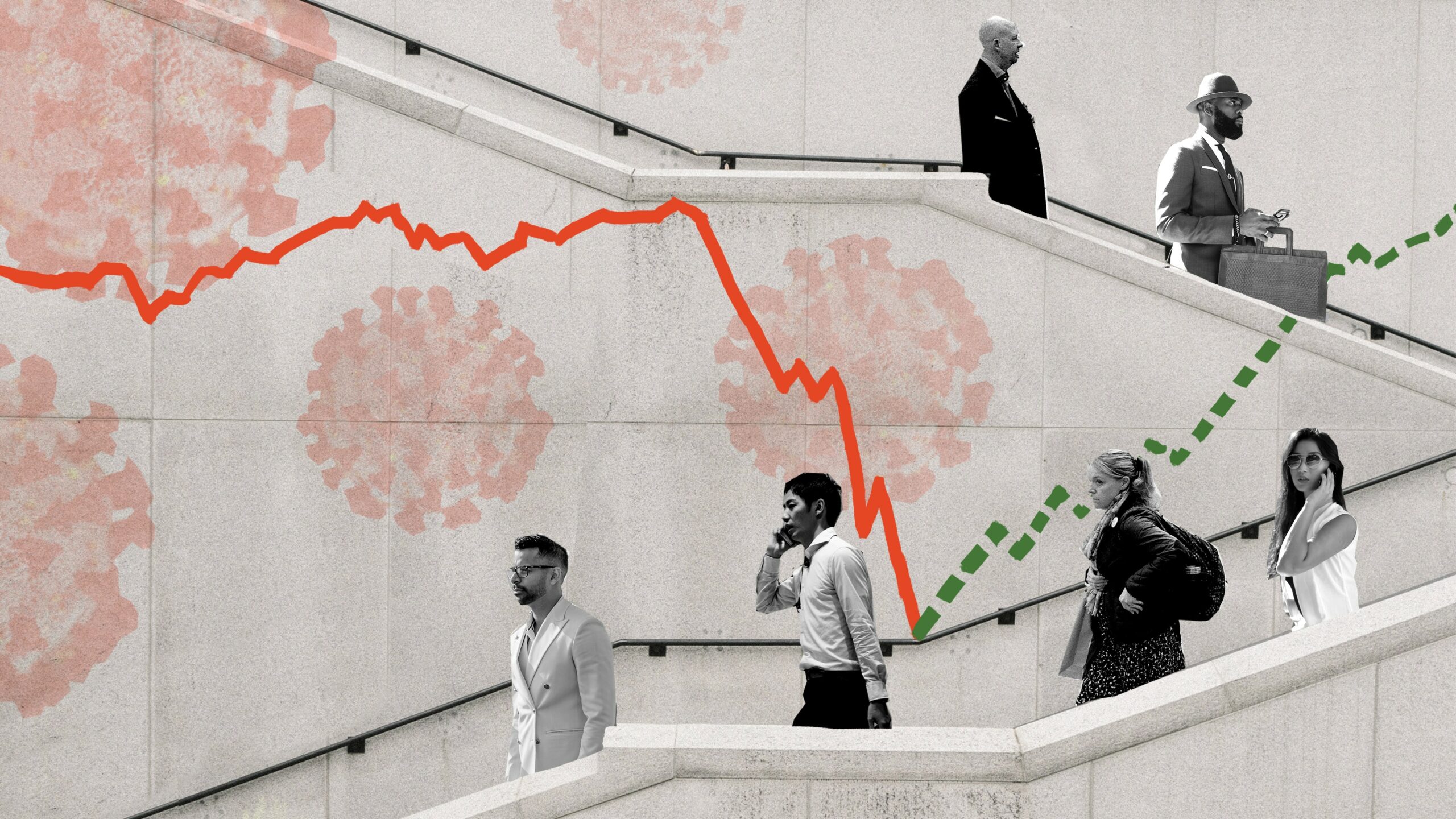Sandra Peter and Kai Riemer

Universal basic income on Corona Business Insights
Why universal basic income could make economies more resilient to crises shock.
As COVID-19 sets out to change the world forever, join Sandra Peter and Kai Riemer as they think about what’s to come in the future of business.
Shownotes
Our infographic with the six conversations around UBI
Our previous conversation of universal basic income
The US’s means-tested, non-universal cash assistance bill
Stanford’s Jennifer Burns on universal basic income
Andrew Yang’s UBI idea is popular again
US corona stimulus package details
Key union proposes UBI in Australia
This episode is part of a podcast series covering what COVID-19 will mean for the business world, where we look at the impact on the economy, businesses, industries, workers and society. This is part of our ongoing coverage of the impact of COVID-19 on the future of business.
Follow the show on Apple Podcasts, Spotify, Overcast, Google Podcasts, Pocket Casts or wherever you get your podcasts. You can follow Sydney Business Insights on Flipboard, LinkedIn, Twitter and WeChat to keep updated with our latest insights.
Send us your news ideas to sbi@sydney.edu.au.
Dr Sandra Peter is the Director of Sydney Executive Plus at the University of Sydney Business School. Her research and practice focuses on engaging with the future in productive ways, and the impact of emerging technologies on business and society.
Kai Riemer is Professor of Information Technology and Organisation, and Director of Sydney Executive Plus at the University of Sydney Business School. Kai's research interest is in Disruptive Technologies, Enterprise Social Media, Virtual Work, Collaborative Technologies and the Philosophy of Technology.
Share
We believe in open and honest access to knowledge. We use a Creative Commons Attribution NoDerivatives licence for our articles and podcasts, so you can republish them for free, online or in print.
Transcript
Intro From the University of Sydney Business School. This is Sydney Business Insights.
Sandra This is Corona Business Insights. And I'm Sandra Peter.
Kai And I'm Kai Riemer.
Sandra With everything that's happening, it's hard to understand what COVID-19 will mean for the business world. We'll look at economy, business, industry, government, workers and society.
Kai Today's topic is universal basic income.
Sandra There have been many conversations in the past couple of weeks.
Kai Conversations around stimulus, what countries are doing to basically soften the impact that the COVID crisis has on individuals who are losing their jobs.
Sandra So just recently, the US passed a two trillion dollar economic stimulus package, which is the largest in US history. So the US Congress will spend about 250 billion dollars and that amounts to about $1,200 per person. And to be eligible, each person must make under $75,000.
Kai In Australia the situation is a little bit more complicated. In the first instance the government has brought in support for those who lost their jobs. So for job seekers, it will effectively double the current $550 per fortnight payments that goes to Social Security receivers. And on top of that, there will be a one off $700 handout to stimulate the economy, which will also go to Social Security and Veteran income receivers. Now, on top of that, recognising that just giving money to those who lost their jobs is not enough, the Australian government also follows the lead by the UK. So the UK government has proposed to pay employers to keep people employed up to 80 per cent of people's wages, to a maximum of £2500 per month. And Australia has now brought in its own program called JobKeeper, which guarantees up to $1500 a fortnight in wages for businesses that are struggling from the downturn, which have seen a drop of at least 30 per cent in their revenue. And that's a 130 billion dollar package. So there's a whole range of proposed measures in the US, Australia and the UK.
Sandra And many people have been asking over the last couple of weeks whether or not this is universal basic income, or have stated that we're finally handing out universal basic income. And whilst this is not universal basic income, and we'll have a short conversation about what that is and why this doesn't qualify, it's still worth having the conversation about what makes a good universal basic income proposal and where to next with this conversation in the time of COVID-19.
Kai So we can safely say that no one has actually put in place a universal basic income. Let's remember, it's defined as an unconditional regular income paid to all residents, regardless of whether they are in work or not. So most proposals that we've seen are actually tied to either a jobseeker status or an employment status or subsidising wages, but it's by no means a universal basic income that is paid unconditionally to everyone.
Sandra And then there is also the regular part of that definition, which means that there should be a regular income. What we've seen in most of these places is that so far this is a one-time thing, although it is likely that the pandemic crisis will go on for months, people's needs are not likely to go away so we might actually see this recurring for a few months.
Kai Yeah. So it's basically either one-off payments or very time-bound payments that will go on for as long as the crisis goes on and no one really knows how long. But there also have been a couple of articles floating around which point to Andrew Yang in the US, the presidential candidate who proposed $1000 a month as a universal basic income payment. There has been an article in The Guardian, and one from Stanford News, and we'll put them in the shownotes, basically people asking, shouldn't we actually consider universal basic income as an emergency measure to cope with this crisis?
Sandra There would be a couple of advantages to that. The first advantage is that you wouldn't have to do the really costly means testing that now seems to be in place in many countries, both in the US and in Australia the idea is to only pay out to people earning under a certain amount. And even in the US, for instance, the Tax Foundation, which is a DC-based think tank, estimates that as is with all the testing, still over 93 percent of people would be eligible for the money anyway.
Kai So Australia has actually proposed to hire 5000 additional Service Australia workers to administer all the measures that are being proposed. And you know while we could argue that these are also jobs that people do, the question would be, are these the most value-adding jobs that we need right now and wouldn't this money be better spent as part of the payments to people directly?
Sandra The other reason why this would be advantageous is that a UBI would give you a regular payment. So there would be monthly payments rather than a one-off, which means that people could plan around it and would have much more security around the income that they get, but also governments as well would find it easier to plan with more and more people losing their jobs in a very uncertain climate.
Kai Many individuals might not even know whether they're eligible because it's quite complicated. Then you have to go, stand in line, or log in online, call up, apply for it. So this whole insecurity and stress that you have as you are losing your job with trying to apply for the payments would go away with an emergency universal basic income.
Sandra But we've got to look beyond the crisis at future implications. UBI has been quite the controversial topic over the past five years, both from a philosophical standpoint of people being for and against it. And there's a policy conversation as to what purpose it serves, how it should be funded and so on. And we'll include in the shownotes a couple of links to the different conversations around universal basic income and the conflicting reasons why people want to have it or how they want to fund it.
Kai So we've previously distinguished five different arguments, and I'll just give them to you very briefly. So the first one is the compensation argument often made by Andrew Yang, which basically says automation will do away with jobs, UBI will help deal with the fallout. The poverty alleviation argument is a social justice argument, which basically says UBI is a good way to look after the poor and lift them up in society. Libertarians favour the small government argument which they say administering the welfare state is expensive. UBI is a much simpler way to provide a basic income. Marxists favour the alienation argument whereby workers are paid a universal basic income that allows them to unshackle themselves from corporates and potentially go and do more creative work. And then there's the common wealth argument, something that actually exists in a place like Alaska where the royalties from mining and natural resources are equally shared among citizens through a universal basic income.
Sandra And whilst a sixth conversation seems to be emerging now, UBI as an emergency measure, there might be a better way to think about the reasons why you would want to have universal basic income.
Kai And we want to call this the 'resilience argument' and ask what if we actually had UBI already? What if we had UBI that made people more independent of their jobs that would not push them off a cliff in a crisis like we have at the moment where they lose their job, but where they could fall back on a guaranteed universal basic income. No stopgap measures would have to be sort of administered and people would be less stressed and could then go about finding new work on the basis of this basic income. So universal basic income as a resilience argument, being resilient in time of a pandemic, of similar crisis that throws a economy into turmoil and leads to mass unemployment such as global financial crises or wars on natural catastrophes or any such thing that we might envision in the future.
Sandra So whilst actual universal basic trials are under way in Finland, in the Netherlands, in Canada, in the US, in India and in Kenya, this current pandemic might give us another trial of what this might look like if we did it at scale.
Kai So we want to end with the proposal to reconsider universal basic income, not on the basis of one of the five existing arguments, but simply as a way to make societies or economies more resilient to economic shock.
Sandra And this is where we want to leave you, we'll be back soon and we'll make sure to include all the links in the shownotes.
Kai Until next time on Corona Business Insights.
Sandra Thanks for listening.
Kai Thanks for listening.
Outro From the University of Sydney Business School, this is Sydney Business Insights, the podcast that explores the future of business.
Close transcript







